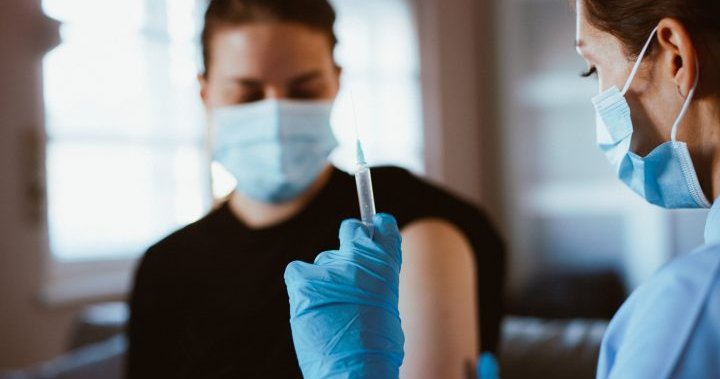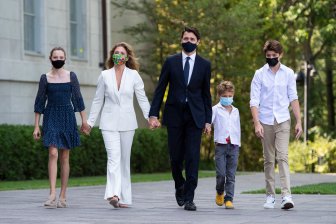Toronto resident Jana Singer started to develop a sore throat when she was on holiday in Mexico last month.
Upon her return at the Toronto Pearson International Airport, Singer tested positive for COVID-19 – almost two months after getting fully vaccinated with a first dose of Moderna followed by Pfizer. She suspects she got the disease walking around unmasked in Baja.
Read more:
Canada seeing ‘low rates’ of COVID-19 cases after vaccination, PHAC says
“I got the vaccine and then I went to a place that had very, very high COVID transmission. And I did nothing to protect myself,” the 44-year-old Canadian told Global News.
Breakthrough cases of COVID-19 — when you are infected at least two weeks after the final dose of a vaccine — have been reported in Canada and elsewhere.
As of July 24, in Ontario alone, among the roughly 8.5 million fully vaccinated people, only 1,988 were infected. They showed symptoms after 14 or more days following the last dose.
Jana Singer says she caught COVID-19 while she was in Mexico for holiday.
Photo supplied
While the cases are rare and unsurprising, experts say continued surveillance amid the spread of the highly transmissible Delta variant is needed.
“There’s nothing unusual about the breakthrough case,” said Dr. Donald Vinh, an infectious disease specialist and a medical microbiologist at the McGill University Health Centre (MUHC).
“What the vaccine is primarily supposed to do is prevent you … from becoming sick once you become infected.
“It doesn’t make you superman or superwoman.”
Vinh stressed that the small frequency of breakthrough infections still highlight the fact that vaccines are “absolutely important”.

Horacio Bach, an infectious diseases expert at the University of British Columbia (UBC), said while the vaccine doesn’t make you completely immune to the virus, it still remains unclear what the long-term effects of infection might be.
“And more problematic is that once you are infected, even if you are vaccinated, you still can release the virus and transmit the virus to other people,” he told Global News.
But breakthrough cases among the vaccinated are less contagious compared to unvaccinated people who get the disease, data suggests.
In the United States, among the 5,879 breakthrough cases reported as of July 31, 2021 in Washington state, 88 per cent had symptoms, seven per cent were hospitalized and 66 people died of COVID-related illness.
For Singer, her bout with COVID-19 was not a bad experience. She says it felt like a regular cold with no fever — and her symptoms resolved within two days.
Read more:
Long COVID rare among children, but experts call for more research
“I was nervous at first because I lost my sense of smell and taste, which is very disturbing,” she said.
Bach’s brother in Israel recently contracted the disease — nearly six months after getting two doses of the Pfizer vaccine.
He developed strong sinusitis, fever and lost his sense of smell and taste as well.
“He was in bed, basically with a very strong flu,” according to Bach.

Vinh said a general trend of COVID-19 among those fully vaccinated were mild symptoms, with a low-grade fever, sore throat and cough.
“What we’re certainly not seeing are symptoms that are so severe that you require ICU,” he added.
Bach agreed, saying symptoms tend to be stronger if you are unvaccinated or partially vaccinated.
Data coming out of the United States suggests the same with the Centres for Disease Control and Prevention (CDC) saying that symptoms and duration of illness in breakthrough cases have been attenuated compared with infections in unvaccinated people.
Among hospitalized or fatal breakthrough cases as July 19, 2021, 74 per cent were aged 65 years or older, the CDC said.
Meanwhile, immunocompromised people — such as those with an underlying condition like cancer — and transplant recipients are at a higher risk of breakthrough infections, Vinh said.
This is because their body cannot respond to the vaccination the same way as healthy individuals.
Read more:
Immunocompromised people should get 3rd COVID-19 vaccine dose, Ontario study finds
“They are at risk of becoming quite sick despite being fully vaccinated because their immune system is weak,” Vinh said.
In fact in the U.S., 44 per cent of breakthrough infections were among people who were immunocompromised — prompting the U.S. Food and Drug Administration to authorize on Thursday a booster dose of COVID-19 vaccines from Pfizer and Moderna for people with compromised immune systems.

New data revealed in Canada by researchers at the University Health Network (UHN) on Aug.11 also pointed in favour of a third-dose vaccine booster for organ transplant recipients.
“In a transplant recipient, we often find the antibodies are undetectable after two doses of vaccine,” said Dr. Deepali Kumar, study co-author and transplant infectious diseases physician.
“What we found in our study was that we had a number of people who were exactly like this … who then became positive after the third dose of vaccine so I think that gives a glimmer of hope to people that maybe they just need that one more shot to mount a positive antibody response,” she told Global News.
While the booster shots may benefit immunosuppressed patients and prevent breakthrough cases among them, Vinh says it’s too early to roll out subsequent doses for the population at large.

Breakthrough infections may even boost immunity, data suggests.
A preprint paper — not yet peer reviewed — from Germany published online last month revealed significantly higher antibody levels in fully vaccinated infected individuals compared to fully vaccinated uninfected individuals.
As for Singer, she says she is happy she got vaccinated.
“Do I believe that that it (the vaccine) protected me? A 100 per cent.”
— With files from Global News’ Caryn Lieberman
View link »
© 2021 Global News, a division of Corus Entertainment Inc.
















































